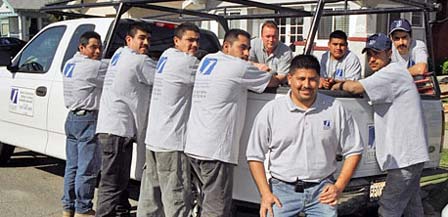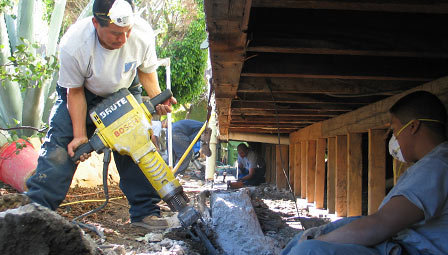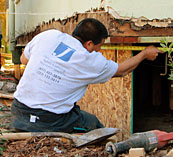 Water is a leading cause of foundation damage and one of its worst enemies. It can ruin your foundation through interior moisture build-up and pooling.
Water is a leading cause of foundation damage and one of its worst enemies. It can ruin your foundation through interior moisture build-up and pooling. The water can come from many sources, such as broken pipes, appliances and clogged sinks or toilets. It can also enter your home through cracks, or gaps in windows or doors. If downspouts aren’t kept clean, water can build up on the roof and drip down the walls and into the basement.
Once inside your home, it can cause the wood in crawl spaces to decay. It can also create an environment where mold can grow, which may lead to wood rot. A wet crawl space, or even one that smells musty, should be inspected immediately by a qualified foundation repairs professional to determine if there are any foundation problems.
Water can also cause soil to expand and contract. When there is too much moisture, the soil surrounding a foundation will swell. As the soil dries, it will begin to shrink and pull away from the foundation. This is especially true with soils that have a high concentration of clay.
As the soil expands, it presses against foundation walls, which can cause them to crack or begin to bow. When the moisture decreases, it leaves spaces. Your foundation will start to settle into these gaps. If the settlement is uneven, the foundation can become damaged.
Expansive soil problems are usually the result of poor drainage. If rainwater or water from a sprinkler system doesn’t drain away for your home, it will remain in the soil and cause it to expand.
Water can also build up in backfill soil – the soil that was used to cover the holes around your house after the foundation was built. Backfill soil is generally much looser than the more compacted soil the house was built on. Looser soil will absorb more water. The more water that is absorbed, the more the soil will expand.
Water can even wash away the soil that surrounds your house and foundation, which can result in sinking.
Some homes have also been built on soil with unusually high moisture content at the time of construction. This moisture will decrease over time, which can also lead to foundation settlement. If the settlement is extensive or uneven, it can damage both your home’s foundation and its structural integrity of your home.
There are many ways to prevent water-related foundation problems from occurring, including making sure any drainage pipes or systems slope away from the house. You can also request a foundation inspection from a foundation repair expert, who will look for signs of potential foundation damage or looming problems that could lead to expensive foundation repair cost down the road.
Unfortunately, California is currently experiencing the worst droughts on record. The situation is so severe, Governor Jerry Brown recently declared a drought emergency. The lack of rain will cause the moisture content in soil throughout the state to decrease. As the drought continues, homeowners may find themselves with new and unexpected foundation issues.
 Shawn Kyles, Julian Construction’s chief building inspector, recently stated: “Now is a good time to start thinking about your foundation maintenance program for the coming year. Regular inspections of your home, landscape, roof and basement are extremely important. They can help you avoid serious foundation issues and the need for major reconstruction. Approximately 1 in 5 homeowners put off making needed repairs. Remember that waiting to fix problems often results in more significant damage and escalated costs. If you want a thorough and detailed inspection of your home and property, contact a foundation repair company with extensive experience. A company that has inspected thousands of homes and businesses will know exactly what to look for when checking out your house. They can also give you knowledgeable advice on any repairs that may be needed.”
Shawn Kyles, Julian Construction’s chief building inspector, recently stated: “Now is a good time to start thinking about your foundation maintenance program for the coming year. Regular inspections of your home, landscape, roof and basement are extremely important. They can help you avoid serious foundation issues and the need for major reconstruction. Approximately 1 in 5 homeowners put off making needed repairs. Remember that waiting to fix problems often results in more significant damage and escalated costs. If you want a thorough and detailed inspection of your home and property, contact a foundation repair company with extensive experience. A company that has inspected thousands of homes and businesses will know exactly what to look for when checking out your house. They can also give you knowledgeable advice on any repairs that may be needed.” Shawn Kyles, Julian Construction’s chief building inspector, wrote the checklist as one that homeowners, “...can use to spot situations that are an indicator of foundation damage as well as problems that can lead to foundation trouble.”
Shawn Kyles, Julian Construction’s chief building inspector, wrote the checklist as one that homeowners, “...can use to spot situations that are an indicator of foundation damage as well as problems that can lead to foundation trouble.”